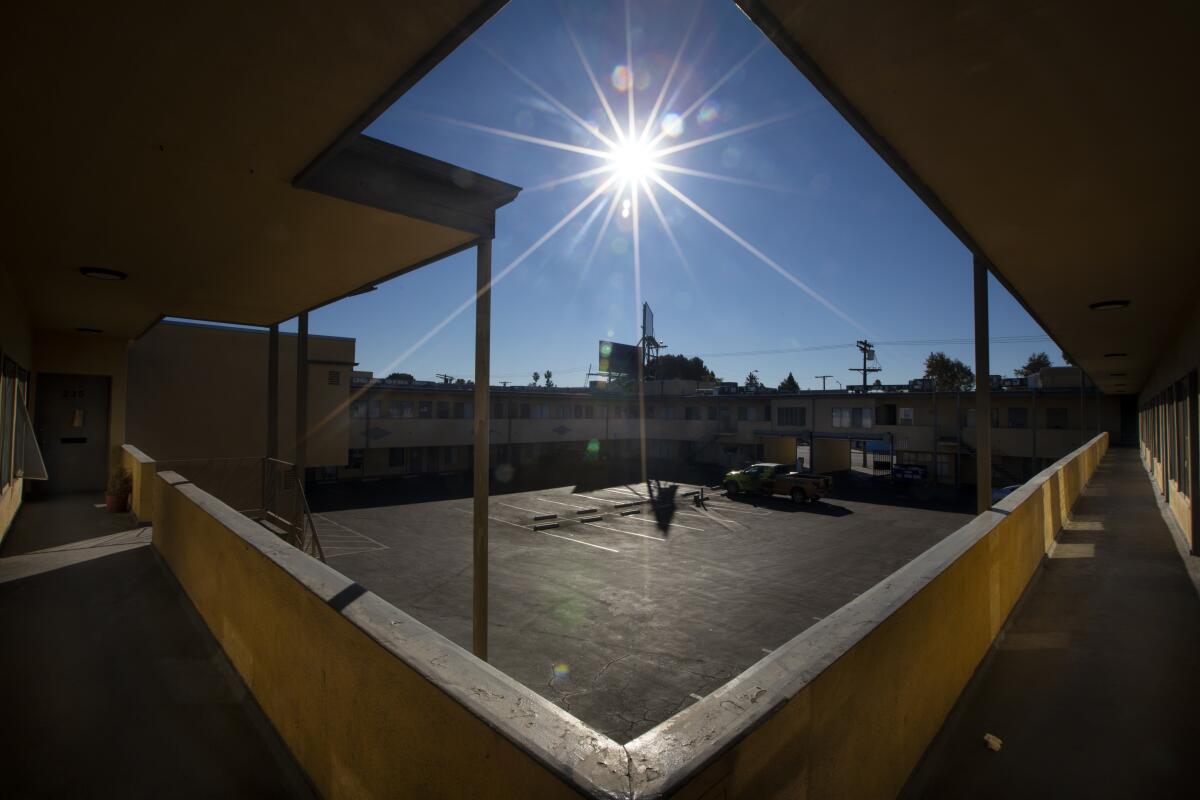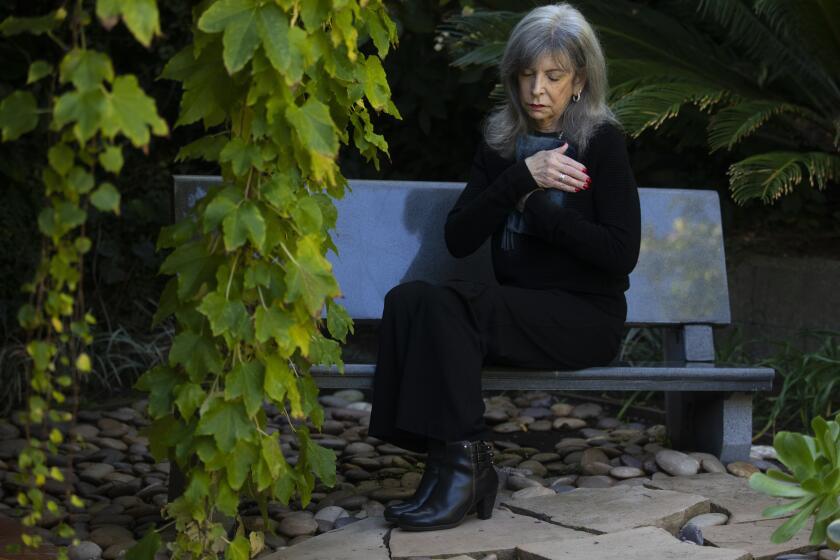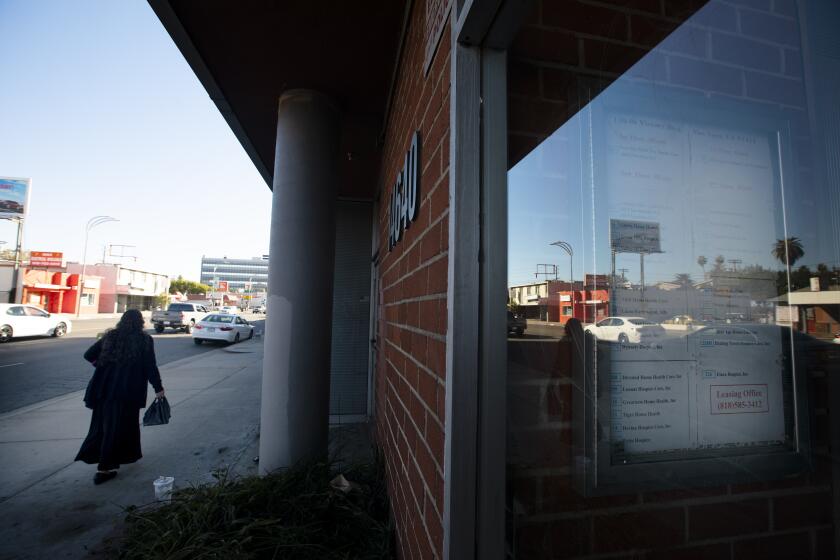Hospice reforms to become law after Times investigation reveals widespread fraud, abuse

Decades of unchecked growth in the California hospice industry will come to a halt Jan. 1, when a moratorium on new licenses takes effect along with reforms aimed at curbing widespread fraud in end-of-life care.
The licensing moratorium and a crackdown on kickbacks and patient-recruiting schemes are at the heart of legislative reforms outlined in two bills largely spurred by a Los Angeles Times investigation of the stateâs booming hospice business last year.
Gov. Gavin Newsom signed the bills into law Monday. An extensive examination by the state auditor also is underway to identify deficiencies and recommend improvements to hospice licensing and oversight.
âThe new laws wonât stop the rampant fraud and abuse The Times exposed, but they are good first steps while the state auditorâs office conducts its investigation on the need for comprehensive reform of hospice oversight in California,â said Michael Connors, a long-term care advocate with California Advocates for Nursing Home Reform.
The Times investigation, published in December, found that explosive growth in hospice providers has transformed end-of-life care that was once the realm of charities and religious groups into a multibillion-dollar business dominated by profit-driven operators.
The rapid expansion has spawned widespread fraud, negligence and mistreatment of some of Californiaâs most vulnerable residents, the newspaper found.
Over the last 20 years, the number of U.S. providers has roughly doubled, while Medicare spending on hospice care has grown by more than six times, to nearly $21 billion a year. More than 1.6 million Medicare beneficiaries now receive care from about 5,000 hospices, the vast majority of them for-profit operators.
Nowhere has the hospice industryâs growth been more explosive, and its harmful side effects more evident, than in Los Angeles County.
Los Angeles Countyâs hospices multiplied sixfold in the last decade, accounting for more than half of the stateâs roughly 1,200 Medicare-certified providers last year, The Timesâ analysis of federal healthcare data showed.
Scores of hospices have sprung up along a corridor stretching west from the San Gabriel Valley through the San Fernando Valley, which had the highest concentration of providers in the nation.
Glendale had 60 hospices, while Burbank had 61 and Van Nuys 63. New York state and Florida each had fewer than 50.
The moratorium is tied to a comprehensive audit requested by state Sen. Ben Allen (D-Santa Monica), the author of Senate Bill 664, which mandates it.
âWe have grave concerns that current regulations fall short of addressing the dramatic increase in the licensing of hospice care providers, some of which appear to be undermining the quality of patient care,â Allen and state Sen. Henry Stern (D-Los Angeles) wrote in May requesting the audit.
The moratorium â which includes exemptions for pending applications and for those that can document a need for a new hospice in a particular geographic area â will remain in effect for 365 days after the audit report is published, which is projected to be in March, according to the auditorâs office. Officials say the wide-ranging audit will:
- Evaluate the growth of hospice providers in California over the last decade, as well as factors that led to it, and determine whether other states have experienced similar expansion and taken steps to address it.
- Assess the scope of hospice fraud and abuse in California and their impact on the Medicare and Medi-Cal programs, which pay for most end-of-life care.
- Identify the most prevalent types of hospice fraud and whether state regulators could do more to protect older Californians.
- Evaluate the effectiveness of Californiaâs systems to identify, address, prosecute and deter hospice fraud and whether more resources are needed.
- Assess the effectiveness and comprehensiveness of state systems to screen and license new hospice providers.
A second bill signed by Newsom addresses another of The Timesâ key findings, namely that intense competition for new patients has spawned a cottage industry of kickbacks to crooked doctors and recruiters who target prospective patients at retirement homes and other venues.
To qualify for hospice, patients must be certified as terminally ill by their attending physicians, if they have them, and by a hospice doctor.
Choosing a reputable hospice can be a challenging task at an emotional time for families.
But many of those signed up by recruiters with promises of medical care, equipment or housekeeping services were not dying, The Times found. Some later learned they had signed away their rights to lifesaving emergency medical treatment.
Sponsored by Assemblywoman Jacqui Irwin (D-Thousand Oaks), Assembly Bill 1280 prohibits hospice providers or their agents from paying recruiters or others for patient referrals.
âWe have a responsibility to ensure that patients who are at the end of life receive the right care that addresses the patientsâ and family needs,â Irwin said, adding that the new law will prohibit all forms of payments, including cash and gift cards, used to induce the selection of a hospice.
âIt also requires that information about hospice care be provided in a manner that is understandable to the patient and their caregivers, and that the assessment for the patient accurately identifies the patientsâ needs for hospice care and services,â she said.
Many of the stateâs hospices are small operations, run by people with little or no healthcare experience. There are few qualifications for starting or operating a hospice beyond having a clean felony record and getting a state license and Medicare certification, a process that costs only a few thousand dollars.
Connors, the patient advocate, cited a litany of further reforms needed: better screening of prospective operators; annual inspections; a complaint hotline; immediate investigations of complaints; sanctions on substandard providers; and access to online information that helps the public âdistinguish good hospices from bad ones.â
âA lot depends on what comes of the state audit that is underway,â he said. âHopefully it will pave the way for comprehensive oversight reforms.â
More to Read
Sign up for Essential California
The most important California stories and recommendations in your inbox every morning.
You may occasionally receive promotional content from the Los Angeles Times.










![[20060326 (LA/A20) -- STATING THE CASE: Marchers organized by unions, religious organizations and immigrants rights groups carry signs and chant in downtown L.A. "People are really upset that all the work they do, everything that they give to this nation, is ignored," said Angelica Salas of the Coalition of Humane Immigrant Rights. -- PHOTOGRAPHER: Photographs by Gina Ferazzi The Los Angeles Times] *** [Ferazzi, Gina -- - 109170.ME.0325.rights.12.GMF- Gina Ferazzi/Los Angeles Times - Thousands of protesters march to city hall in downtown Los Angeles Saturday, March 25, 2006. They are protesting against House-passed HR 4437, an anti-immigration bill that opponents say will criminalize millions of immigrant families and anyone who comes into contact with them.]](https://ca-times.brightspotcdn.com/dims4/default/34f403d/2147483647/strip/true/crop/1983x1322+109+0/resize/840x560!/quality/75/?url=https%3A%2F%2Fcalifornia-times-brightspot.s3.amazonaws.com%2Fzbk%2Fdamlat_images%2FLA%2FLA_PHOTO_ARCHIVE%2FSDOCS%2854%29%2Fkx3lslnc.JPG)



